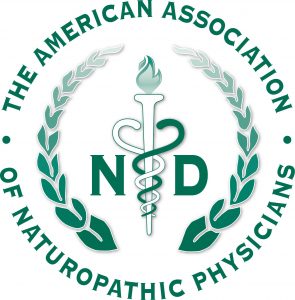Advice to Patients on the Difference Between Turmeric and Curcumin as Medical Treatments
April 10, 2017
Clinicians and Researchers often use the Names “Turmeric” and “Curcumin” Interchangeably, Causing Confusion Among Patients
 Washington, DC – The American Association of Naturopathic Physicians (AANP) released the
Washington, DC – The American Association of Naturopathic Physicians (AANP) released the
following information and advice for patients on the difference between turmeric and curcumin when they are used as medical treatments: Turmeric is a plant that when harvested, cleaned, dried, and powdered becomes a gold-colored spice. Commonly used in Asian food, turmeric is the main spice in curry. Turmeric has been used for centuries to treat a wide variety of conditions, including those of the skin, pulmonary, and gastrointestinal systems, aches, pains, wounds, sprains, and liver disorders.
Curcumin
Curcumin is the main active ingredient in turmeric. First chemically characterized in
1910, today curcumin is used for its anti-inflammatory and antioxidant properties.1
“While turmeric is the parent botanical that curcumin comes from, they are different
chemical compounds,” said Dr. Paul Anderson, a naturopathic doctor, pharmacology and
biochemistry professor, and leading authority in intravenous (IV) therapy formulation and
infusion techniques, including IV administration of curcumin. “An unfortunate circumstance
is that many people, including clinicians and researchers, use the terms ‘turmeric’ and
‘curcumin’ interchangeably. This can cause confusion among patients seeking information
on the medical treatments available using them and is a disservice to those who might
benefit from the therapeutic use of these compounds.”
WebMD Definition of Turmeric and Curcumin
According to WebMD, turmeric and curcumin are typically administered either orally, as a
supplement, or applied to the skin. Both are considered safe in the appropriate dosages.
Additionally, curcumin can be administered intravenously, which results in better and faster
absorption. However, according to Dr. Anderson, patients considering IV administrations of
curcumin should be aware that while turmeric and curcumin are related, they are not the
same thing.
“For curcumin, there are FDA-registered compounding pharmacies manufacturing curcumin
for IV administration with FDA-approved products and in compliance with Section 503A and other applicable sections of the Federal Food, Drug, and Cosmetic Act,” said Dr. Anderson.“There is also an intravenous curcumin medication currently in Phase II of the FDA approval
process and no adverse events have occurred. And there are numerous scientific trials using
intravenous curcumin underway. For turmeric, there are no trials for intravenous use and,
to the best of my knowledge, no turmeric is being manufactured for IV administration in the
United States.”
Advice for patients on medical treatments using turmeric and curcumin for the protection of patients, the AANP offers the following advice to anyone interested in
turmeric or curcumin medical treatments:
- Consult with a naturopathic (ND) or conventional doctor (MD) before being
treated with turmeric or curcumin. Make sure you know which agent is being
recommended and talk to your physician about which one is right for you and how it should
be administered in your situation. - Make sure your ND is licensed or certified. Not all practitioners who call themselves
naturopathic doctors are licensed or certified to practice naturopathic medicine. To be
licensed or certified, a doctor must have completed a four-year program at a naturopathic
medical school accredited by agencies recognized by the U.S. Department of Education. The
AANP maintains a list of states and U.S. territories that license naturopathic physicians. - Provide your doctor with your complete medical history and that of family
members, and inform him or her of any medications or supplements you might be
taking. Your health status is based on genetics, environment and lifestyle. Together, these
factors provide essential clues to medical conditions you might be at risk for or that might
run in your family. In addition, knowing what pharmaceuticals or supplements you are
taking can help your doctor avoid known potential problems. - Ask questions and make sure you understand any treatment or medication that
is being recommended. Ensuring patient safety is the top priority and everyone involved
in the health care system has a role to play, including you. As an active, involved and
informed member of your own health care team, you can help make your health care
experience safer. - Know that no medication or medical treatment is 100% safe, including some
that are commonly used by many people every day. For example, there over 1,000
FDA-approved drugs that list the terms “fatal” and “anaphylaxis” (pertaining to Type 1
allergy) in their adverse event section. Even a commonly used medicine such as
acetaminophen (Tylenol) presents significant risks, with more than 56,000 emergency room
3 visits, 2,600 hospitalizations, and an estimated 458 deaths due to acute liver failure from
the use of acetaminophen.2
According to the National Institutes of Health, more than one third of American adults use
some form of complementary, alternative, or integrative treatment. The AANP estimates
that 2 million patients benefit from naturopathic treatment, and many of these patients
have not found relief for their health conditions through conventional care. While all
consumers are advised to become informed about all aspects of their health care, they
deserve access to therapies that have a long history of safe use.
About Dr. Paul Anderson
Dr. Paul Anderson is a naturopathic physician, researcher, and leading authority in
intravenous (IV) therapy formulation and infusion techniques. He is CEO of the Anderson
Medical Group in Seattle, which includes Advanced Medical Therapies, a state-of-the-art
medical center providing fully compliant IV, hyperbaric, and mild hyperthermia therapies.
Dr. Anderson is former Chief of IV Services for Bastyr Oncology Research Center and a past
Professor at Bastyr University, where he continues to consult in research design and holds
the rank of Full Professor. He is a graduate of the National University of Natural Medicine in
Portland, Oregon and began instructing classes at naturopathic medical schools in the early
1990s. His monograph on the intravenous use of curcumin for cancer and chronically ill
patients is available here.
Source:
- Menon VP, Sudheer AR. Antioxidant and anti-inflammatory properties of curcumin. Advanced
Experimental Medical Biology 2007;595:105-25.










